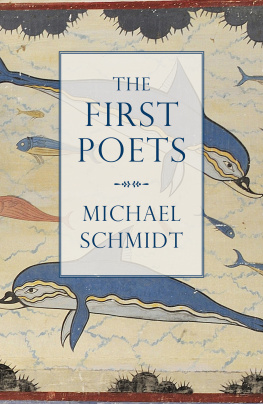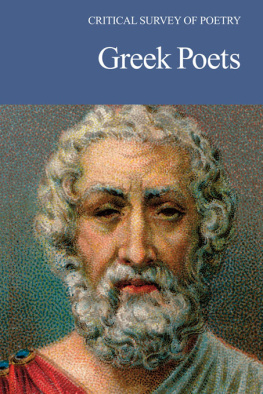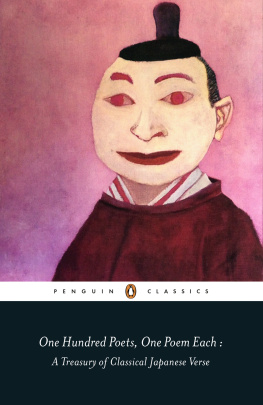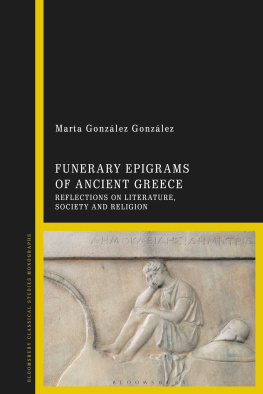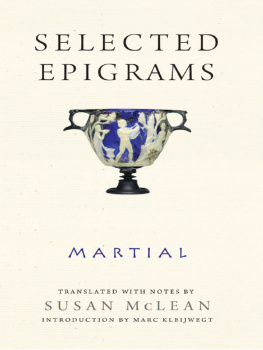
In honor of beloved Virgil
O degli altri poeti onore e lume...
Dante, Inferno
The publisher gratefully acknowledges the
generous support of the Classical Literature
Endowment Fund of the University of California
Press Foundation, which was established by a
major gift from Joan Palevsky.
Ancient Greek Epigrams
Ancient Greek Epigrams
Major Poets in Verse Translation
Gordon L. Fain

UNIVERSITY OF CALIFORNIA PRESS
Berkeley Los Angeles London
University of California Press, one of the most distinguished
university presses in the United States, enriches lives around the
world by advancing scholarship in the humanities, social sciences,
and natural sciences. Its activities are supported by the UC Press
Foundation and by philanthropic contributions from individuals
and institutions. For more information, visit www.ucpress.edu .
University of California Press
Berkeley and Los Angeles, California
University of California Press, Ltd.
London, England
2010 by The Regents of the University of California
Illustrations by Margery J. Fain
Library of Congress Cataloging-in-Publication Data
Ancient Greek epigrams : major poets in verse translation/
Gordon L. Fain.
p. cm.
Includes bibliographical references and index.
ISBN 978-0-520-26579-0 (cloth : alk. paper)
ISBN 978-0-520-26580-6 (pbk. : alk. paper)
1. Epigrams, GreekTranslations into English. 2. Greek
poetryTranslations into English. I. Fain, Gordon L.
PA3623.A5F35 2010
881.0108dc22 2009042975
Manufactured in the United] States of America
19 18 17 16 15 14 13 12 11 10
10 9 8 7 6 5 4 3 2 1
This book is printed on Cascades Enviro 100, a 100% post
consumer waste, recycled, de-inked fiber. FSC recycled certified
and processed chlorine free. It is acid free, Ecologo certified, and
manufactured by BioGas energy.
To the late Guy Lee and the late John Crook,
both of St. Johns College, Cambridge,
both born on Guy Fawkes Day

Pindar, Pae. 12, fr. 52m
CONTENTS
Chapter 1
Introduction to Ancient Greek Epigrams
Chapter 2
Anyte
Chapter 3
Leonidas of Tarentum
Chapter 4
Asclepiades
Chapter 5
Posidippus
Chapter 6
Callimachus
Chapter 7
Theocritus
Chapter 8
Meleager
Chapter 9
Philodemos
Chapter 10
Lucillius
PREFACE
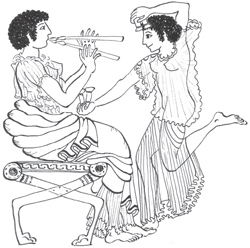
The epigrams of the ancient Greeks had an enormous influence on Latin and later European poetry and are familiar to scholars, but they are not very well known to the general reader. Part of the reason is that editions of Greek epigrams in translation often include too many poems of too many poets. Anyone who peruses the more than four thousand epigrams in the Loeb Greek Anthology is likely to be quickly discouraged. Many of the poems are difficult to understand without some explanation, and the majority are not very good. The best are among the finest poetry the Greeks ever wrote, but finding them is not a task for the faint of heart.
For this reason I have assembled an anthology containing what I believe to be the most interesting poems of the most accomplished authors, with an introduction to the poetry and poets and with explanatory notes that place each epigram in context. Since this is a book for the general reader, I do not give the Greek texts, and there are no footnotes. The general reader is unlikely to be aided by extensive citations of the secondary literature, and scholars should be able to follow my arguments without them. I provide a selected bibliography of books and articles including those mentioned in the text, emphasizing works the general reader might find interesting. I give only a small fraction of the literature I have consulted in making my translations and writing the notes, and I extend my apologies to colleagues whose publications have not been specifically mentioned.
I am greatly indebted to the Helen Riaboff Whiteley Center at Friday Harbor, Washington, where most of the translations were done, and to Churchill College, Cambridge, where the introductory chapter was written and the book finished. I am also indebted to David Blank, who read ; to Michael Haslam, who read the whole of the manuscript and helped with the proofs; and to the anonymous referees of University of California Press. The text has greatly profited from their many corrections and perceptive suggestions. The press was enormously helpful at every stage in the preparation of the book, and I am particularly grateful to the copy editor, Alice Falk. My greatest debt is to my wife, Margery, who did the illustrations, read all of the text in several drafts, made innumerable helpful recommendations, and provided the love and support during the writing of the book that made it possible for me to complete it.
CHAPTER ONE
Introduction to Ancient
Greek Epigrams

When we think of an epigram, we think of a short, witty poem with a clever ending. The ancient Greeks had a very different conception. Epigrams to them were verses written on something, as the word implies. At least initially, they were poems engraved on tombstones or monuments, or on statues or other offerings to the gods. Many of these inscriptions have survived to the present day in ancient shrines and cemeteries. Like inscriptions on our own memorials and gravestones, they are forthright expressions of patriotism or personal sentiment, sometimes moving but often formulaic and usually short, occasionally consisting of a single line.
Prompted by these poems written with some practical aim in view, the Greek poets of the third century BCE composed literary epigrams intended not to be inscribed but to be recited and published. Many of these poems were also epitaphs and dedications to gods, at first closely patterned on poems any literate Greek could have read in a temple or by the side of a village road. The poets then began to play with the form of actual inscriptions in clever and amusing poems of great variety. They expanded the range of epitaphs to include, for example, poems about dolphins washed ashore and lying dead on the beach. They wrote fictive inscriptions for fishermen or for elderly women who spun thread for a daily wage, who normally would be too poor to afford a grave marker. At about the same time, Greek poets also began to write epigrams about love. These charming poems are less closely related to inscriptions and probably emerged from the tradition of short songs and verses sung or recited at drinking parties. Greek love epigrams had an immense influence on Latin poetsnotably on Catullus, who also wrote love epigrams, and on Propertius and Ovid, who wrote love elegies closely related to the Greek poems in style and theme. Then, much later, at the time of the Roman emperor Nero, the Greek poet Lucillius abandoned epitaphs, love, and practically everything else in favor of satirical epigrams with clever endings. The poems Lucillius wrote provided the thematic models for the Latin poet Martial, whose snappy verse with point established the epigram in the form it still has today.
Next page




